How long has personalization been “the future of travel”? Virtually every company has said personalization/segmentation is a strategic priority on their roadmap. However, evidence of deep segmentation and hotel personalization is hard to find amongst hotels' digital properties.
My team analyzed emails, landing pages, and display ads to see if the implementation truly matches the press releases and announcements.
Everyone is talking about it, but who is actually implementing it with success?
Airbnb Personalization

Airbnb has invested heavily in machine-learning, particularly to drive bookings of their Experiences post-accommodation booking.
“Historical data tells us that when visiting Paris Japanese travelers prefer Classes & Workshops (e.g. Perfume making), US travelers prefer Food & Drink Experiences." - Airbnb data science team
Obviously having a large team of machine learning experts on staff gives Airbnb an edge. Airbnb is also already positioned as a marketplace disruptor, so it is no surprise that they lead the pack here.
Interestingly, the Airbnb homepage is not well-personalizing for logged out users who have made a recent search. Airbnb.com is static other than a geo-personalized message for host sign up.

Marriott
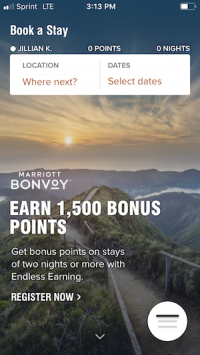
Marriott is running most of its complex AI through its Bonvoy mobile app, According to the Marriott technology team the app is using user data, intent data, and attribution data to make complex and targeted offerings.
However, when our team used the app the only major application of personalization we noticed was a revenue optimization around points.
Another major initiative is Marriott’s partnership with Salesforce to launch a customer recognition platform that provides a “360-degree view of each guests’ profile.” The goal is to collect all customer interactions into a central hub so that Marriott staff can act on the information.
Storing this information in a central CRM also empowers Marriott to serve digital content based on behavioral and demographic data.
Marriott was also the first major hospitality brand to implement beacon geo-location (currently in a dozen or so hotels) in common areas of select hotels, however that program now appears to be defunct. That said, it demonstrates Marriott’s commitment to leading the pack with personalization.
Hilton
Hilton has recently hired more than 150 data scientists and is now collecting more than one billion data points daily to drive decision making. One of the big areas of focus is their email communication, which according to their recent announcements works in an automated 1-to-1 way.
We looked at emails received by the Hilton Honors members on our team and didn't notice any significant different other that promotion of different points values for the co-brand card sign up.
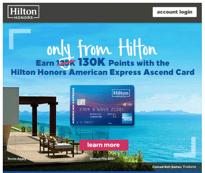
This email was received the same day as ...
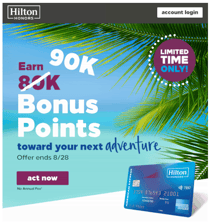
This email. We assume the different points values are based on behavioral data by the different customers.
Roughly 80% of digital personalization is done via email, so it is no surprise that Hilton has invested in optimization of this channel. However, most marketers feel that email's effectiveness is waning. We know that Hilton understands this and continues to invest in other channels, so expect to see personalization pushed out across a variety of communication platforms.
Caesar's
Caesar’s, like many Vegas-centric brands, has had to innovate to reach younger consumers who have less interest in gambling. Their technology uses a deep-learning algorithm which creates an “emotional profile” of customers which generates relevant email language to each individual. These personalized messages led to a 12% increase in email open rates, and a 24% increase in click-through rates.
Intercontinental Hotel Group
All IHG marketing communications - whether through email, SMS, or Facebook Messenger - originate from a single platform so that personalization and contextualization can incorporate centralized analytics.
They’ve also integrated with natural language processing tools to support their virtual assistant and improve case resolution time for customer service inquiries.
Best Western
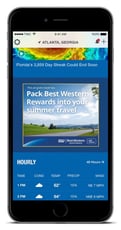
Best Western was the first major hotel chain to run AI-powered ads with IBM Watson. These ads included an embedded chatbot that allowed viewers to make selections about their trip. The chatbot behavior was structured around the known behavior patterns of Best Western's 35M loyalty members.
They also have been leveraging personalized emails since 2014, including geo-location. However, there is little information about their current efforts. We are excited to see what is next!
Wyndham Hotels & Resorts
Wyndham Hotels & Resorts CIO Scott Strickland fully admits that some of Wyndham’s recent initiatives, like emailed in support tickets, and a native mobile app are “table stakes” these days. However, Strickland has committed the company to serving the needs of various customer groups on their preferred communication channel, and has also instilled a commitment to technology in the company’s strategic plan.
Accor
Accor’s digital strategy over the past five years has largely focused on acquisition and increasing direct bookings through the halo of luxury and exclusivity. As of now their personalization strategy is centered around tailoring your on-property experience into what they refer to as “Sparkle Stories,” as well as revenue management.
Radisson
In 2018 Radisson appointed Accenture as its global experience agency specifically to leverage data for targeted campaigns. The agency said there are plans to increase qualified traffic with curated content, and to implement a chatbot specifically designed for meeting and event planners.
Choice Hotels
Choice has dipped its toe into the AI waters, mostly related to revenue optimization.
“The results that we saw even from that tiny investment in AI were outstanding. Astounding and outstanding, to the point where I was almost uncomfortable publishing them, because I didn’t think anyone would believe it.” - Terrilyn Tourangeau, Director of Loyalty Marketing.
We’re expecting that Choice will be prioritizing personalization across their entire strategy in the near future.
Magnuson
Magnuson aims to make basic personalization easy with the ability to select your location at the top of their website. However, it is unclear what new content is being delivered once you do make a search.
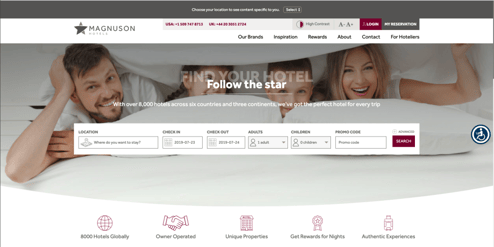
It is clearly on their radar, so we’ll see what they do with this info.
Consumers are demanding a personalized experience.
Their interactions with brands like Amazon, have become the standard - they want a tailored experience that predicts their wants and needs. For Amazon roughly 35% of sales are generated from their recommendation engine, so the ROI on even relatively basic investments has enormous impact on the bottom line.
Companies have more data than ever to drive personalization. Hospitality brands get to know their customers in an intimate way at multiple touch points throughout the year. I believe the brands that leverage this knowledge into a robust, predictive digital experience will be the market leaders over the next decade.
The good news is that personalization and AI programs are still in their infancy for most hotels and hospitality companies. So, the field is wide open!
If you’re at one of these hotels and want to share what’s brewing for your personalization and segmentation strategy, we’d love to hear from you! Contact marketing@iseatz.com

